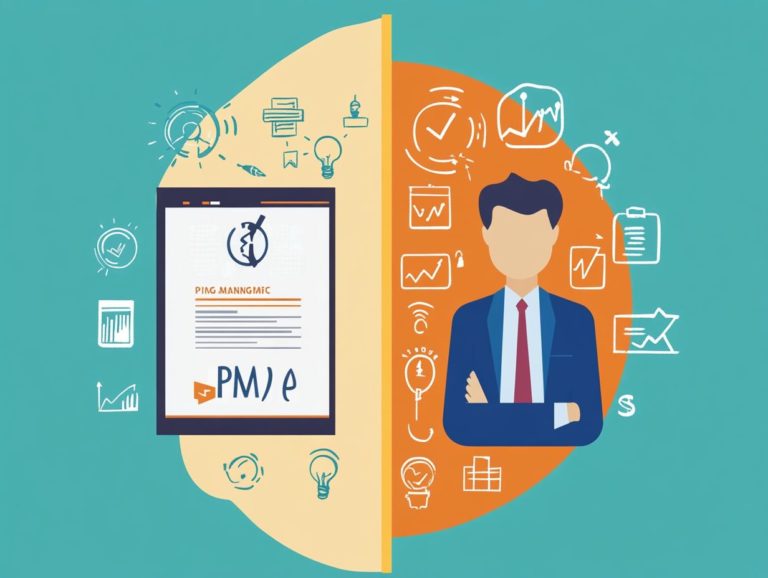Certification Options for Project Management Specialists
Project management certification has emerged as a vital credential for professionals like you who are eager to elevate their careers in today s competitive landscape.
Whether you aspire to climb the career ladder, increase your marketability, or boost your earning potential, getting certified can open doors to amazing career opportunities!
This article explores the different types of project management certifications available and guides you on how to select the right one tailored to your goals. We ll also discuss effective strategies for exam preparation and maintaining your certification.
Explore how this very helpful asset can significantly shape your professional journey.
Contents
- Key Takeaways:
- Benefits of Project Management Certification
- Types of Project Management Certifications
- Choosing the Right Certification for You
- Preparing for Project Management Certification Exams
- Maintaining Your Certification
- Frequently Asked Questions
- Got questions? Here are some answers!
- What are the certification options available for project management specialists?
- What is the difference between PMP and CAPM certifications?
- What are the benefits of becoming a certified project management specialist?
- How can I prepare for a project management certification exam?
- Are there any prerequisites for getting certified as a project management specialist?
- Do project management certifications expire?
Key Takeaways:

- Project management certification can lead to career advancement and higher salaries.
- There are various types of project management certifications, each with its own benefits and requirements.
- When choosing a certification, consider your career goals, industry, and level of experience.
What is Project Management Certification?
Project Management Certification is an important credential that validates your knowledge and skills in various aspects of project management, including project planning, risk management, and current certification trends for effectively collaborating with everyone involved in a project.
Prestigious organizations like the Project Management Institute (PMI) offer these certifications, including popular options such as the Agile Certified Practitioner and the Project Management Professional (PMP).
For project managers wanting to refine their skills and showcase their expertise in managing complex projects, navigating the world of project management certifications can be very helpful. Getting certified reflects your commitment to best practices in the field and equips you with essential tools to navigate the intricacies of project management.
With a variety of certifications available for different experience levels and specializations, you can choose the path that aligns with your career aspirations and industry demands. Eligibility typically includes a mix of education, experience, and sometimes passing an exam.
The PMI stands as a leading authority, offering rigorous training and resources that enable you to prepare effectively.
Beyond showcasing your competency, these certifications can unlock significant career advancement opportunities, boost your earning potential, and enhance your business value, as organizations increasingly seek certified professionals to drive successful projects.
Benefits of Project Management Certification
Obtaining a Project Management Certification presents numerous advantages that can profoundly elevate your career trajectory and overall contribution to organizational objectives.
As a certified professional, you’re likely to encounter enhanced career advancement opportunities, refined project management skills, and increased marketability in today’s competitive job landscape, especially with knowledge of the future of project management certifications.
These certifications can boost team performance significantly and enable you to manage project life cycles effectively, ensuring the successful delivery of projects.
Career Advancement and Opportunities
Project management certifications can significantly boost your career opportunities. These essential project management courses for certification not only demonstrate your commitment to professional growth but also highlight your competence in various project roles.
With credentials like the Project Management Professional (PMP) and Certified Project Director, you can position yourself as a leader in your field, making you more appealing to employers and paving the way to higher-level positions within your organization. This proactive approach showcases your mastery of essential project management skills while aligning with industry demands that favor certified professionals.
In fact, studies indicate that individuals with PMP certification typically earn about 20% more than their non-certified peers. Certifications such as Agile Certified Practitioner (PMI-ACP) cater specifically to those managing agile projects, ensuring you are well-prepared for the latest methodologies and trends in project execution.
By effectively bridging the gap between technical knowledge and managerial expertise, you enhance your attractiveness to potential employers, significantly increasing your chances of securing desirable promotions and job opportunities.
Increased Marketability and Salary Potential
Getting project management certifications boosts your marketability. Employers seek candidates with verified skills that drive real business value.
Research shows that certified project managers often earn significantly higher salaries than their non-certified peers. These qualifications are a smart investment in your professional future.
As industries evolve, ongoing training and certifications are essential for maintaining your competitive edge. The Project Management Institute reports that certified project managers can earn up to 23% more than those without certification. This highlights the tangible benefits of these credentials.
Organizations value professionals who can adapt to new methodologies and tools. Committing to continuous education sharpens your skills and signals dedication to professional growth, attracting potential employers.
This proactive learning approach keeps you at the forefront of industry trends, ultimately enhancing your career trajectory.
Types of Project Management Certifications

A variety of project management certifications cater to different experience levels and specialized areas within the field, highlighting the role of certification in project management career.
Among the most notable are:
- Project Management Professional (PMP)
- Certified Associate in Project Management (CAPM)
- Agile Certified Practitioner (ACP)
- PRINCE2 (a structured project management method used primarily in the public sector)
These certifications fulfill a range of roles from entry-level to advanced positions enabling you to choose pathways that align with your career aspirations and the needs of your organization.
Overview of Popular Certifications
Popular project management certifications, such as the Project Management Professional (PMP), Agile Certified Practitioner (ACP), and PRINCE2, provide unique frameworks tailored to your project management needs. For guidance on selecting the best option, check out this resource on how to choose the right project management certification.
The PMP certification dives deep into comprehensive project management processes, tools, and techniques applicable across industries. To earn this certification, you need a strong amount of project management experience and education.
The ACP certification is designed for those who thrive in agile environments. It emphasizes adaptive planning and rapid iterations, perfect for IT projects that demand flexibility. Prerequisites for this certification include existing project management experience.
PRINCE2 offers a structured approach to project management, helping you understand essential roles, processes, and themes necessary for successful project implementation.
By acquiring these certifications, you not only enhance your skills but also significantly boost your employability and career advancement prospects across sectors like IT and business.
Choosing the Right Certification for You
Selecting the right project management certification can profoundly influence your career trajectory. It’s crucial to weigh several factors before deciding.
Consider your current experience level, the specific skills you aim to acquire, the types of projects you wish to oversee, and the roles you aspire to hold.
By thoughtfully evaluating these elements, you can ensure the certification you choose aligns with your career ambitions and meets industry demands.
In conclusion, investing in project management certifications enhances your career prospects. Start exploring your options today!
Factors to Consider
When selecting a project management certification, consider your current experience and the skills you wish to develop. Align these factors with your organizational goals. Exploring online project management certification programs can help you pinpoint the certification that best fits your career objectives and the specific needs of your industries of interest.
For example, if you are currently a coordinator at a tech startup and want to lead software development projects, look for certifications that emphasize flexible project management approaches, like Scrum, which are highly sought after in the tech industry.
It’s also important to recognize emerging trends in remote project management. As skills in virtual team collaboration and digital communication tools grow in demand, consider the necessary skills, such as risk management and stakeholder engagement.
By doing so, you can strategically choose a certification that enhances your existing abilities and prepares you for future roles in an ever-evolving landscape. Act now to secure your future!
Preparing for Project Management Certification Exams
Preparing for your project management certification exams requires a well-structured approach. Start by selecting the right study materials that suit your learning style and goals.
Next, develop effective exam strategies tailored to your strengths and weaknesses. Enhance your project management knowledge through targeted education, focusing on core concepts, methodologies, and practices essential for success.
A comprehensive preparation plan not only boosts your chances of passing but also ensures you have a deep understanding of the material that will serve you well in your professional endeavors.
Study Materials and Exam Strategies

Choosing the right study materials and exam strategies is essential for success in project management certification exams. This ensures that you are well-prepared and have a solid grasp of the key concepts.
Key resources to consider include:
- Official PM training programs
- Comprehensive study guides
- Practice exams
- Online forums to exchange insights and tips with fellow candidates, enhancing your preparation
Along with these resources, you ll find various books dedicated to project management principles that offer in-depth theoretical knowledge coupled with real-world applications. Online courses provide flexibility, allowing you to learn at your own pace while tapping into interactive content and expert guidance.
Practice tests are invaluable tools for familiarizing yourself with the exam format and identifying areas that may need extra attention. Equally important are your exam strategies: prioritize time management, focus on high-yield topics that frequently appear on tests, and use project management software for practical experience.
Joining study groups or engaging with community resources can deepen your understanding and provide the support you need during your preparation.
Maintaining Your Certification
To maintain your project management certification, adhere to continuing education requirements and stay updated on the latest project management practices. This ensures the validity of your credentials.
Most certifications require ongoing professional development, which may involve attending workshops, participating in webinars, or pursuing additional certifications in relevant fields.
This commitment to lifelong learning not only reinforces your expertise but also enhances your professional value in an ever-evolving industry. Stay ahead of the competition by continuously updating your skills!
Continuing Education Requirements
Continuing education is crucial for keeping your project management certification active. It ensures you stay updated on the latest practices and methodologies.
Certifications like Project Management Professional (PMP) and Agile Certified Practitioner require you to earn Professional Development Units (PDUs) to maintain your certification. You can earn PDUs through various activities, like:
- Attending webinars
- Participating in workshops
- Pursuing relevant academic courses
Engaging in these educational pursuits strengthens your credentials and boosts your confidence in navigating complex projects.
By committing to professional development, you align with industry innovations and trends, enhancing your performance and success in your role.
Frequently Asked Questions
Got questions? Here are some answers!
What are the certification options available for project management specialists?
There are several certification options for project management specialists, including:
- Project Management Professional (PMP)
- Certified Associate in Project Management (CAPM)
- Program Management Professional (PgMP)
What is the difference between PMP and CAPM certifications?

PMP stands for Project Management Professional. It is a more advanced certification for experienced project managers. Conversely, CAPM stands for Certified Associate in Project Management. It is ideal for entry-level project managers or those looking to transition into project management.
PMP requires more experience and a higher level of education compared to CAPM.
What are the benefits of becoming a certified project management specialist?
Becoming certified as a project management specialist can advance your career, increase your earning potential, and improve your skills and knowledge in the field. Exploring certification paths for aspiring project managers can help you find the right route to achieve these goals.
It also gives you a competitive edge in the job market, as many organizations prefer certified professionals for project management roles. Don’t miss out! Start your certification journey today to enhance your career!
How can I prepare for a project management certification exam?
Various study materials and resources are available, such as books, online courses, practice tests, and study groups.
It is also recommended to have a combination of hands-on experience and theoretical knowledge to pass the exam.
Are there any prerequisites for getting certified as a project management specialist?
The requirements vary depending on the certification. Generally, you will need a certain level of education and work experience in project management.
Some certifications also require a specific number of hours of project management training.
Do project management certifications expire?
Yes, most project management certifications are valid for a specific period. You will need to renew them by meeting certain requirements, such as earning PDUs or retaking the certification exam.
It is essential to stay updated with the renewal requirements to maintain your certification status.






